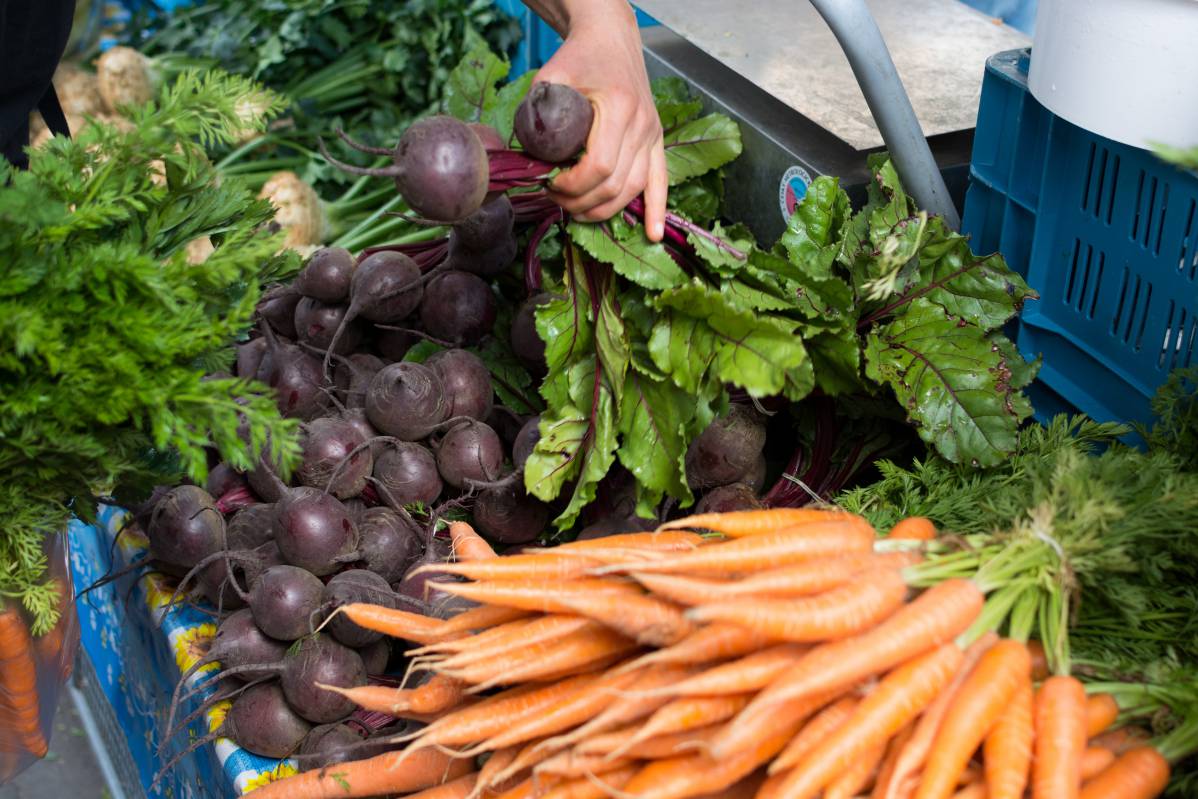Farm to table practices often have a significant positive impact on local community health. Living in the Bay Area, I have seen the benefits of farm to table up close.
The good news is that following farm to table principles also supports community health.

Healthy People
By sourcing food from local farms, communities can ensure that their produce is fresh and nutrient-rich. Locally grown fruits and vegetables are often harvested at peak ripeness, which means they retain more nutrients compared to produce that has been shipped long distances.
This can directly benefit the overall health of individuals living a farm to table lifestyle.
Healthy Community
In addition to providing healthier options, farm to table initiatives also promote a sense of community engagement and connection. When individuals support local farmers by purchasing their products, it creates a direct relationship between consumers and producers.
This fosters a stronger sense of trust and appreciation for where our food comes from. It also encourages people to become more involved in supporting local agriculture, whether through volunteering on farms or advocating for policies that protect small-scale farmers.
8 Ways Farm To Table Supports Community Health
Fresh and Nutrient-rich Produce
Farm-to-table practices often help ensure the freshness and nutrient richness of produce. By minimizing the distance and time between harvest and consumption, these methods preserve the natural flavors and nutritional value of fruits and vegetables.
This direct sourcing from local farms allows for timely picking of ripe, vitamin-packed produce, enhancing the overall quality of meals and promoting a healthier lifestyle for consumers.
This sense of connection…strengthens the bonds within the community.
Local Reduces Environmental Impact
Choosing locally grown fruits and veggies is like giving the environment a friendly helping hand. When this local grown produce makes its way to our plates, they’ve already won half the battle in the fight against pollution. That’s because they haven’t traveled miles and miles to get to us, consuming energy along the way. Farm to table means healthy bodies and a healthier planet.
Consumer-Farmer Relationships Bear Fruit
Farm-to-table initiatives help foster community engagement and connection by bridging the gap between local farmers and consumers. These efforts support nearby agricultural businesses and local economies. Farmers and consumers being closer together creates opportunities for dialogue and shared understanding.
This sense of connection not only enhances individuals’ awareness of the food they consume but also strengthens the bonds within the community. This promotes a deeper sense of belonging and unity for all.

Better Know a Food Chain
The farm-to-table movement cultivates a profound sense of trust and appreciation for the origins of our food. Direct relationships between local farmers and consumers cultivates an understanding of the journey from farm to plate. People gain a better understanding of the growing and production processes, witnessing firsthand the care and dedication that goes into cultivating each ingredient.
Farm to table can also inspire individuals to directly engage in local agriculture…
This heightened awareness builds a stronger connection to the land, the seasons, and the hardworking individuals behind the scenes. As a result, consumers develop a trust in the quality, freshness, and sustainability of their food. This brings with it a genuine appreciation for the intricate web of effort that sustains us and the environment.
Encourages volunteerism and advocacy
Farm to table can also inspire individuals to directly engage in local agriculture by volunteering time or advocating for policies that safeguard small-scale farmers. When people develop a closer connection to the sources of their food, they often feel compelled to take a hands-on role in their community’s agricultural landscape.
This also nurtures a sense of shared responsibility for the agricultural heritage that sustains us all.
Volunteering on local farms not only provides direct assistance to farmers but also offers a unique educational experience (it’s great for kids!), enabling volunteers to learn about sustainable practices and the challenges faced by small-scale producers. By getting involved, individuals contribute to the resilience and prosperity of their local food systems. This also nurtures a sense of shared responsibility for the agricultural heritage that sustains us all.
Creates Healthy Options For Local Schools
Farm to table programs can play a crucial role in assisting local organizations and schools to offer accessible and affordable produce options to individuals in need. By connecting with nearby farmers and sourcing fresh, locally grown produce, these programs ensure that nutritious food reaches vulnerable communities. These can include subsidized meal programs, community gardens, or farmers’ markets.
This not only supports local agriculture but also promotes healthier eating habits among kids…
Through these efforts, farm-to-table programs (sometimes called “farm-to-schools”) contribute to a more equitable food distribution, improving the well-being of children within under-served populations. This not only supports local agriculture but also promotes healthier eating habits among kids and their families, who may otherwise face limited access to fresh and whole foods.

More Food For More People
These initiatives can have a transformative impact on people. Direct collaborations with local farmers and establishing a direct link between producers and consumers helps eliminate the barriers that often prevent marginalized communities.
Through initiatives like community-supported agriculture (CSA) programs, farmers’ markets, and partnerships with local organizations, farm-to-table endeavors create avenues for individuals in under-served regions to procure more and fresher food. This also promotes improved dietary choices, fostering a positive impact on health and well-being.
Prioritizing local sourcing…reduces vulnerabilities to disruptions in the global distribution network.
The farm-to-table approach exemplifies the potential for sustainable, community-centered solutions that bridge gaps and empower disadvantaged communities to embrace a healthier lifestyle.
Improves on Food Insecurity
Finally, farm-to-table practices can contribute to increased resilience of the food supply chain. One way is through shortened distances between producers and consumers. Fostering local agricultural diversity also has a positive impact. Prioritizing local sourcing and reducing reliance on long-distance transportation also reduces vulnerabilities to disruptions in the global distribution network.
Finally, a direct relationship between farmers and consumers established through farm-to-table initiatives enables more agile responses to changing conditions, such as shifts in demand or unexpected challenges. This promotes stability and sustainability within communities.
…multiple benefits of farm to table practices help address and minimize this.
Goods For All
Of all the reasons why farm to table might support community health, those last few might be the most important. Throughout the world, across most societies, local farming and agriculture was part of every community. In those days (or places) when there was a food crisis, everyone was in iti together.
In modern times, food insecurity is a serious issue within many communities. But multiple benefits of farm to table practices help address and minimize this.
By prioritizing locally sourced foods, these initiatives make fresh and nutritious options more accessible to everyone, regardless of income level or geographic location. And healthy people make for healthier, stronger communities.
